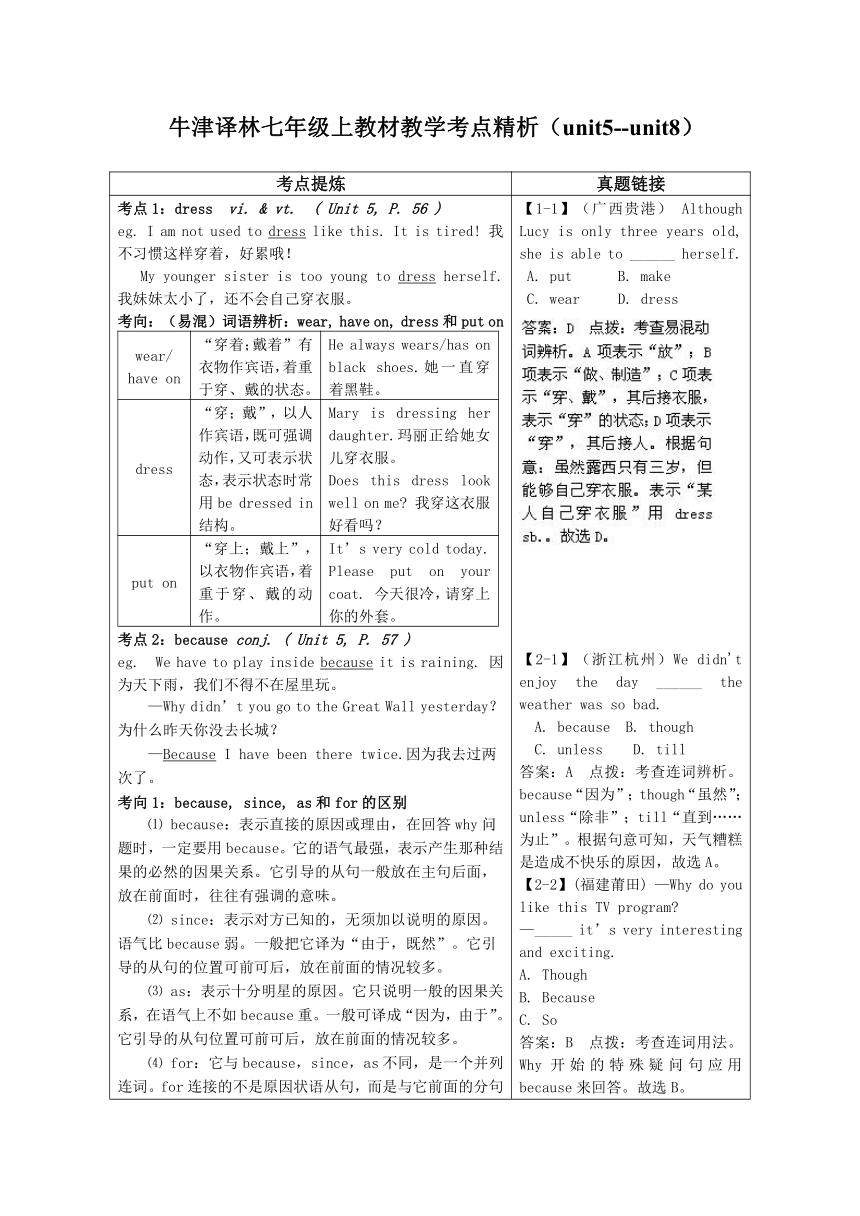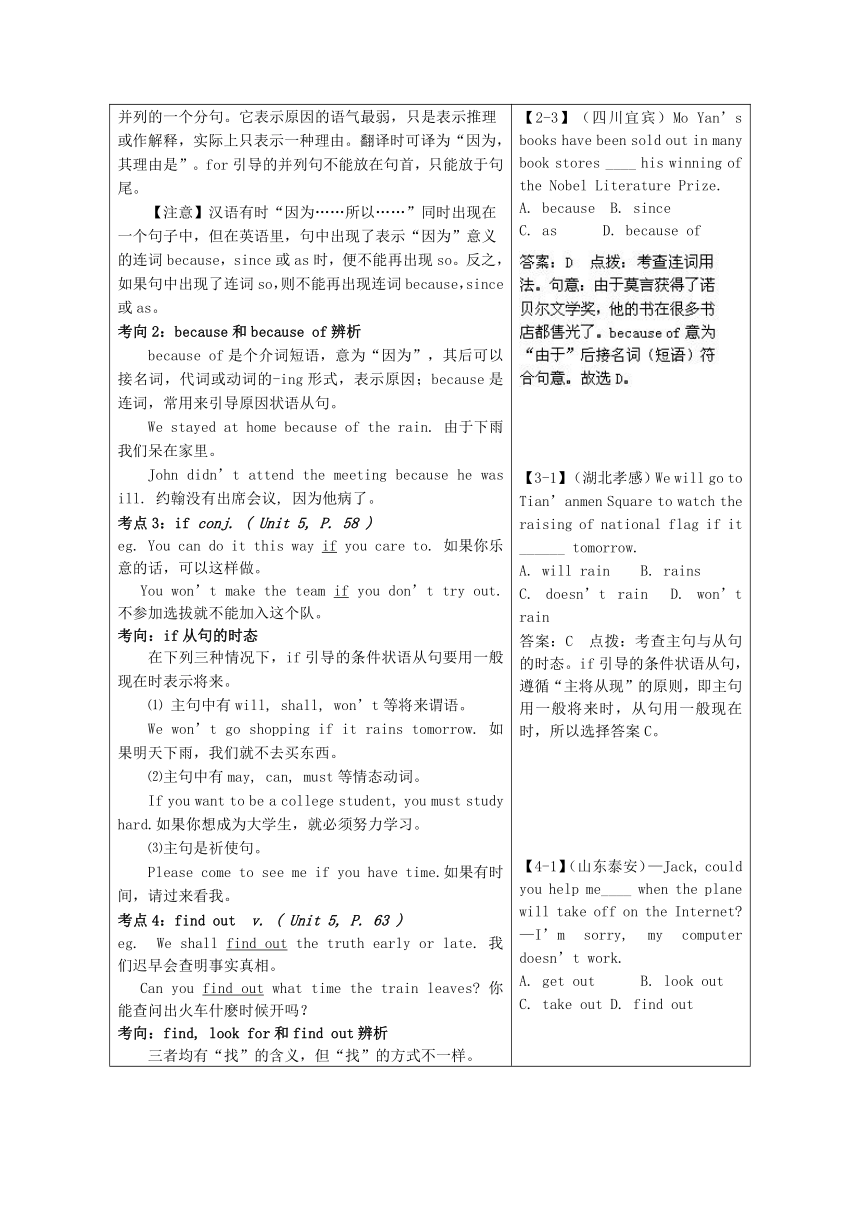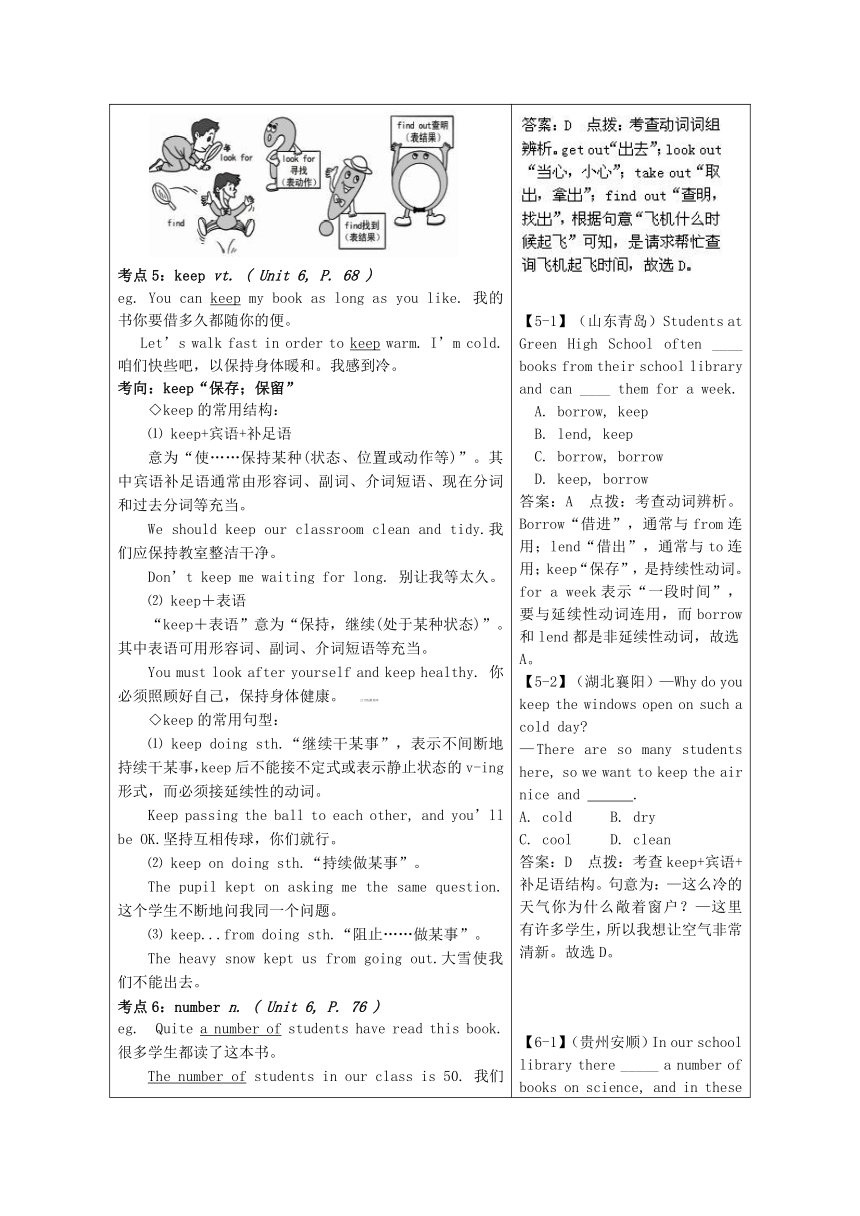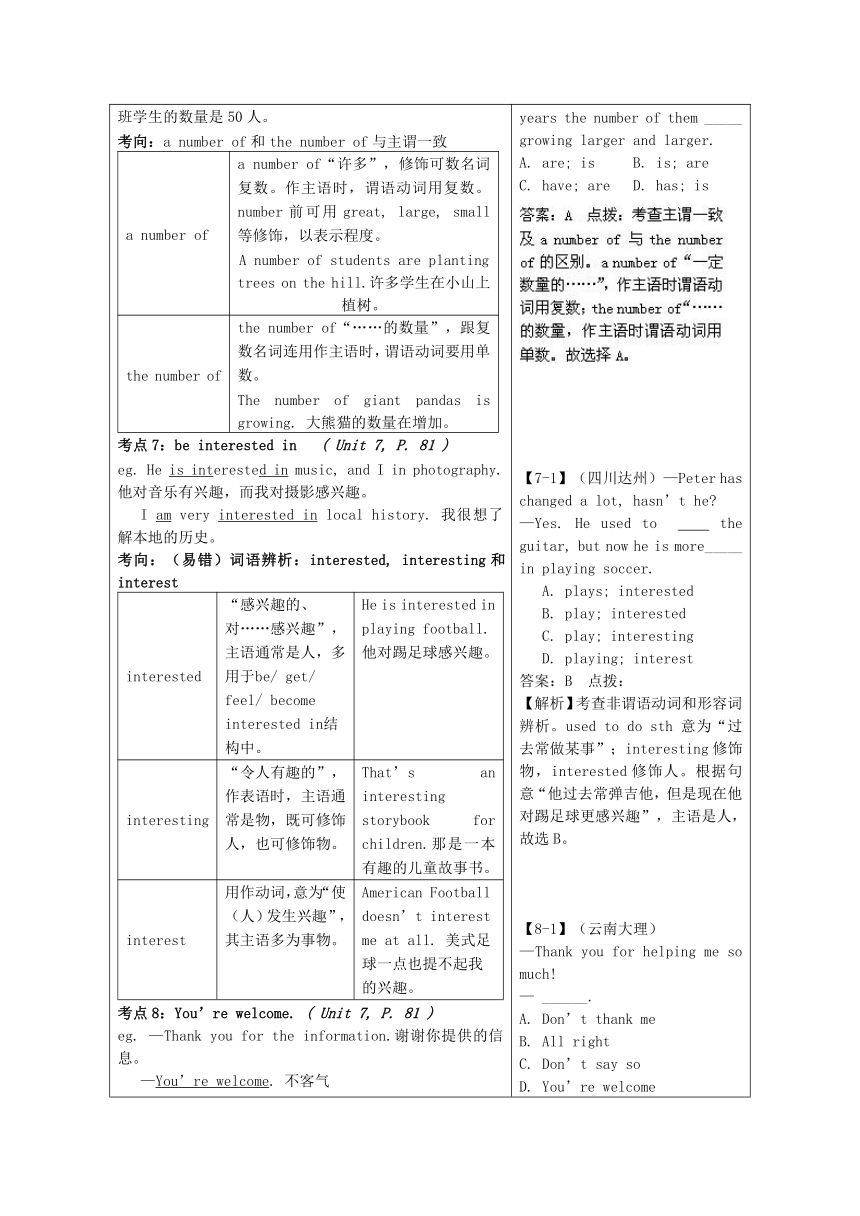牛津译林版英语七年级上教材教学考点精析(unit5--unit8)
文档属性
| 名称 | 牛津译林版英语七年级上教材教学考点精析(unit5--unit8) |  | |
| 格式 | zip | ||
| 文件大小 | 202.8KB | ||
| 资源类型 | 教案 | ||
| 版本资源 | 牛津译林版 | ||
| 科目 | 英语 | ||
| 更新时间 | 2016-07-23 23:16:03 | ||
图片预览




文档简介
牛津译林七年级上教材教学考点精析(unit5--unit8)
考点提炼
真题链接
考点1:dress vi. & vt. ( Unit 5, P. 56 )
eg. I am not used to dress like this. It is tired! 我不习惯这样穿着,好累哦!
My younger sister is too young to dress herself.我妹妹太小了,还不会自己穿衣服。
考向:(易混)词语辨析:wear, have on, dress和put on
wear/ have on
“穿着;戴着” 有衣物作宾语,着重于穿、戴的状态。
He always wears/has on black shoes.她一直穿着黑鞋。
dress
“穿;戴”,以人作宾语,既可强调动作,又可表示状态,表示状态时常用be dressed in 结构。
Mary is dressing her daughter.玛丽正给她女儿穿衣服。
Does this dress look well on me? 我穿这衣服好看吗?
put on
“穿上;戴上”,以衣物作宾语,着重于穿、戴的动作。
It’s very cold today. Please put on your coat. 今天很冷,请穿上你的外套。
考点2:because conj. ( Unit 5, P. 57 )
eg. We have to play inside because it is raining. 因为天下雨,我们不得不在屋里玩。
—Why didn’t you go to the Great Wall yesterday?为什么昨天你没去长城?
—Because I have been there twice.因为我去过两次了。
考向1:because, since, as和for的区别
⑴ because:表示直接的原因或理由,在回答why问题时,一定要用because。它的语气最强,表示产生那种结果的必然的因果关系。它引导的从句一般放在主句后面,放在前面时,往往有强调的意味。
⑵ since:表示对方已知的,无须加以说明的原因。语气比because弱。一般把它译为“由于,既然”。它引导的从句的位置可前可后,放在前面的情况较多。
⑶ as:表示十分明星的原因。它只说明一般的因果关系,在语气上不如because重。一般可译成“因为,由于”。它引导的从句位置可前可后,放在前面的情况较多。
⑷ for:它与because,since,as不同,是一个并列连词。for连接的不是原因状语从句,而是与它前面的分句并列的一个分句。它表示原因的语气最弱,只是表示推理或作解释,实际上只表示一种理由。翻译时可译为“因为,其理由是”。for引导的并列句不能放在句首,只能放于句尾。
【注意】汉语有时“因为……所以……”同时出现在一个句子中,但在英语里,句中出现了表示“因为”意义的连词because,since或as时,便不能再出现so。反之,如果句中出现了连词so,则不能再出现连词because,since或as。
考向2:because和because of辨析
because of是个介词短语,意为“因为”,其后可以接名词,代词或动词的-ing形式,表示原因;because是连词,常用来引导原因状语从句。
We stayed at home because of the rain. 由于下雨我们呆在家里。
John didn’t attend the meeting because he was ill. 约翰没有出席会议, 因为他病了。
考点3:if conj. ( Unit 5, P. 58 )
eg. You can do it this way if you care to. 如果你乐意的话,可以这样做。
You won’t make the team if you don’t try out.不参加选拔就不能加入这个队。
考向:if从句的时态
在下列三种情况下,if引导的条件状语从句要用一般现在时表示将来。
⑴ 主句中有will, shall, won’t等将来谓语。
We won’t go shopping if it rains tomorrow. 如果明天下雨,我们就不去买东西。
⑵主句中有may, can, must等情态动词。
If you want to be a college student, you must study hard.如果你想成为大学生,就必须努力学习。
⑶主句是祈使句。
Please come to see me if you have time.如果有时间,请过来看我。
考点4:find out v. ( Unit 5, P. 63 )
eg. We shall find out the truth early or late. 我们迟早会查明事实真相。
Can you find out what time the train leaves? 你能查问出火车什麽时候开吗?
考向:find, look for和find out辨析
三者均有“找”的含义,但“找”的方式不一样。
考点5:keep vt. ( Unit 6, P. 68 )
eg. You can keep my book as long as you like. 我的书你要借多久都随你的便。
Let’s walk fast in order to keep warm. I’m cold. 咱们快些吧,以保持身体暖和。我感到冷。
考向:keep“保存;保留”
◇keep的常用结构:
⑴ keep+宾语+补足语
意为“使……保持某种(状态、位置或动作等)”。其中宾语补足语通常由形容词、副词、介词短语、现在分词和过去分词等充当。
We should keep our classroom clean and tidy.我们应保持教室整洁干净。
Don’t keep me waiting for long. 别让我等太久。
⑵ keep+表语
“keep+表语”意为“保持,继续(处于某种状态)”。其中表语可用形容词、副词、介词短语等充当。
You must look after yourself and keep healthy. 你必须照顾好自己,保持身体健康。 21世纪教育网
◇keep的常用句型:
⑴ keep doing sth.“继续干某事”,表示不间断地持续干某事,keep后不能接不定式或表示静止状态的v-ing形式,而必须接延续性的动词。
Keep passing the ball to each other, and you’ll be OK.坚持互相传球,你们就行。
⑵ keep on doing sth.“持续做某事”。
The pupil kept on asking me the same question.这个学生不断地问我同一个问题。
⑶ keep...from doing sth.“阻止……做某事”。
The heavy snow kept us from going out.大雪使我们不能出去。
考点6:number n. ( Unit 6, P. 76 )
eg. Quite a number of students have read this book. 很多学生都读了这本书。
The number of students in our class is 50. 我们班学生的数量是50人。
考向:a number of和the number of与主谓一致
a number of
a number of“许多”,修饰可数名词复数。作主语时,谓语动词用复数。number前可用great, large, small等修饰,以表示程度。
A number of students are planting trees on the hill.许多学生在小山上植树。
the number of
the number of“……的数量”,跟复数名词连用作主语时,谓语动词要用单数。
The number of giant pandas is growing. 大熊猫的数量在增加。
考点7:be interested in ( Unit 7, P. 81 )
eg. He is interested in music, and I in photography. 他对音乐有兴趣,而我对摄影感兴趣。
I am very interested in local history. 我很想了解本地的历史。
考向:(易错)词语辨析:interested, interesting和interest
interested
“感兴趣的、对……感兴趣”,主语通常是人,多用于be/ get/ feel/ become interested in结构中。
He is interested in playing football.他对踢足球感兴趣。
interesting
“令人有趣的”,作表语时,主语通常是物,既可修饰人,也可修饰物。
That’s an interesting storybook for children.那是一本有趣的儿童故事书。
interest
用作动词,意为“使(人)发生兴趣”,其主语多为事物。
American Football doesn’t interest me at all. 美式足球一点也提不起我的兴趣。
考点8:You’re welcome. ( Unit 7, P. 81 )
eg. —Thank you for the information.谢谢你提供的信息。
—You’re welcome. 不客气
考向:You’re welcome.的交际用法
You’re welcome.“别客气,不用谢”,通常用来回答对方的感谢。除此之外还有Not at all, That’s all right.也可以表示“别客气,不用谢”之意。
—Thank you for helping me with my English? 感谢你帮助我学习英语。
—You’re welcome.不用谢。
考点9:enough det. & pron. ( Unit 7, P. 82 )
eg. Do you have enough time to finish the paper? 你有足够的时间写完论文吗?
It is cold enough for us to go skating. 天气够冷的,可以滑冰了。
考向:enough的用法
enough用作形容词时,常在句子中作定语,即可放在名词之前,也可放在名词之后;用作副词时,总是放在被修饰的词的后面;作名词时,不可数,意思是“充足,足够”。
Two men are quite enough.两个人足够了。
It’s light enough for reading.天亮得可以看书了。21世纪教育网
They can’t walk fast enough.他们走得不快。
Have you played enough? 你玩够了没有?
考点10:fit v.. ( Unit 7, P. 88 )
eg. The arms of this coat of mine don’t fit.我这件大衣的袖子不合适。
The second pair is a better fit, but he does not like the colour. 第二双大小比较合适,但他不喜欢它的颜色。
考向:(易混)词语辨析:match, fit, suit
match
品质、颜色、设计等方面匹配,即“与……相配”。
This sport jacket will match those pants nicely. 这件运动衫和那条短裤很相配。
fit
及物动词:适合,配上,合身,使人适应;不及物动词:表吻合,合身。
The dress doesn’t fit her. She is too thin.
这件衣服不适合她,她太瘦了。
suit
适合,常强调颜色、式样等适合某人。
It doesn’t suit you to have your hair cut short.
你不适合剪短发。21世纪教育网
考点11:another pron. ( Unit 7, P. 88 )
eg. Would you care for another piece of cake? 您再来一块蛋糕好吗?
Saying is one thing, and doing is another. 说是一回事,做又是另一回事。
考向:词语辨析:another, other, the other, others
单 数
复 数
泛指
another(另外一个,再一……)
作定语
other (boys)
作主语、宾语others
特指
the other(另外那个)
the other (boys)
the others
⑴ another“另外一个、再—……”,是泛指而不是特指,指同类中的任何一个。常用来指至少三个中的一个,也可指在原有基础上再累加一个。
Would you like another cup of tea?你要再来一杯茶吗?
⑵ the other“另一个”,是特指,往往指两个人或物中的另一个。常用于one... the other...结构中。
There are two apples on the table. One is big, the other is small.桌上有两个苹果。一个大,另一个小。
⑶ the others是the other的复数形式,指代其余的或剩下的人或事物,为代词。
I went swimming while the others played tennis. 我去游泳,其余的人都打网球去了。
⑷ other“其他的、另外的、别的”,在句中作定语用,后面一般接名词复数,表示泛指。
I have many other things to do.我有许多其他的事情要做。
⑸ others泛指其他的、另外的或别的人或事物,在句中往往作主语或宾语。常用于some... others...结构中。
Some people came by car, others come on foot. 有些人是坐汽车来的,其他人是走着来的。
考点12:among prep. ( Unit 8, P. 94 )
eg. I am the eldest among my cousins. 我是表兄弟姐妹中年龄最大的。
New York is among the largest cities in the world. 纽约是世界上最大的几座城市之一。21世纪教育网
考向:between和among的用法辨析
⑴ between一般指“两者之间”,而among用于三个或三个以上的人或物之中,或笼统的一群人或一些物之中,表示“在……中间”。
Between the door and the windows there is a map.门和窗户的中间有一张地图。
The young people lived and worked among the workers.
那些年青人生活、工作在工人之中。
⑵ between还可以用来指三个或三个以上的人或物的每两个之间。三个或三个以上的名词用and连接,前面用between,而不用among。
Switzerland lies between France, Germany, Austria and Italy.瑞士位于法、德、奥、意之间。
⑶ among可用来表示一个比较的范围,=one of,常与最高级连用。
She is the tallest among her classmates. 她在她同学之中是最高的。
考点13:both pron. ( Unit 8, P. 94 )
eg. There are many trees on both sides of the dell.溪谷的两岸有许多树木。
We are sure both of us have a brighter future.我们相信双方都有一个光明的前景。
考向1:both用作代词
both可作形容词、代词或副词用,意思是“两个”、“双方”、“两个都”。both和both of后都可接复数名词,构成名词词组。
His parents are both workers. 他的父母都是工人。
Both of us like the film. 我们两个都喜欢这部电影。
考向2:both…and…
both...and...“两者都;既不……又不……;不但……而……”,只能用来连接两个并列的词或短语,不能用来连接分句或句子。
Both you and I are students.我们俩都是学生。
both...and...相对应的连词结构是neither...nor...(既不……也不……)。
Neither you nor I am a student.你不是学生,我也不是学生。
考点14:be made of ( Unit 8, P. 96 )
eg. The boxes are made of pasteboard.这些盒子是纸板做的。
This armchair is made of bamboo. 这个扶手椅是用竹子做成的。
考向:be made构成的短语辨析
考点15:look for ( Unit 8, P. 97 )
eg. We must look for somewhere to live.我们必须找个地方住下。
He has come all the way from Leeds to look for a job. 他从利兹远道而来寻找工作。
考向:look构成的常用短语
look+介词/ 副词
词义
例句
look after
照看
She is looking after the baby now.她在照看小孩。
look at
看
Look at the second paragraph on page fifteen. 请看第十五页的第二段。
look for
寻找
Mary is looking for you now. 玛丽正在找您。
look like
与…相似
That photograph doesn’t look like her at all.那张照片看上去一点都不像她。
look out
当心,留神
Look out!A car is coming. 注意,有车来了。
look round
环顾
Don’t look round; I don’t want him to notice us.不要四下张望,我不想让他注意我们。
look through
浏览
I try to look through four newspapers at the table.我想在吃饭时把四份报纸看一遍。
look up
查(词典)
It is a good habit to look up the new words in a dictionary. 有生词就查字典是一个良好的习惯
【1-1】(广西贵港) Although Lucy is only three years old, she is able to ______ herself.
A. put B. make
C. wear D. dress
【2-1】(浙江杭州)We didn't enjoy the day ______ the weather was so bad.
A. because B. though
C. unless D. till
答案:A 点拨:考查连词辨析。because“因为”;though“虽然”;unless“除非”;till“直到……为止”。根据句意可知,天气糟糕是造成不快乐的原因,故选A。
【2-2】(福建莆田) —Why do you like this TV program?
—_____ it’s very interesting and exciting.
A. Though
B. Because
C. So
答案:B 点拨:考查连词用法。Why开始的特殊疑问句应用because来回答。故选B。
【2-3】(四川宜宾)Mo Yan’s books have been sold out in many book stores ____ his winning of the Nobel Literature Prize.
A. because B. since
C. as D. because of
【3-1】(湖北孝感)We will go to Tian’anmen Square to watch the raising of national flag if it ______ tomorrow.
A. will rain B. rains
C. doesn’t rain D. won’t rain
答案:C 点拨:考查主句与从句的时态。if引导的条件状语从句,遵循“主将从现”的原则,即主句用一般将来时,从句用一般现在时,所以选择答案C。
【4-1】(山东泰安)—Jack, could you help me____ when the plane will take off on the Internet?
—I’m sorry, my computer doesn’t work.
A. get out B. look out
C. take out D. find out
【5-1】(山东青岛)Students at Green High School often ____ books from their school library and can ____ them for a week.
A. borrow, keep
B. lend, keep
C. borrow, borrow
D. keep, borrow
答案:A 点拨:考查动词辨析。Borrow“借进”,通常与from连用;lend“借出”,通常与to连用;keep“保存”,是持续性动词。for a week表示“一段时间”,要与延续性动词连用,而borrow和lend都是非延续性动词,故选A。
【5-2】(湖北襄阳)—Why do you keep the windows open on such a cold day?
—There are so many students here, so we want to keep the air nice and .
A. cold B. dry
C. cool D. clean
答案:D 点拨:考查keep+宾语+补足语结构。句意为:—这么冷的天气你为什么敞着窗户?—这里有许多学生,所以我想让空气非常清新。故选D。
【6-1】(贵州安顺)In our school library there _____ a number of books on science, and in these years the number of them _____ growing larger and larger.
A. are; is B. is; are
C. have; are D. has; is
【7-1】(四川达州)—Peter has changed a lot, hasn’t he?
—Yes. He used to the guitar, but now he is more_____ in playing soccer.
A. plays; interested
B. play; interested
C. play; interesting
D. playing; interest
答案:B 点拨:
【解析】考查非谓语动词和形容词辨析。used to do sth 意为“过去常做某事”;interesting修饰物,interested修饰人。根据句意“他过去常弹吉他,但是现在他对踢足球更感兴趣”,主语是人,故选B。
【8-1】(云南大理)
—Thank you for helping me so much!
— ______.
A. Don’t thank me
B. All right
C. Don’t say so
D. You’re welcome
答案:D 点拨:考查交际用语。You’re welcome.=That’s all right.=Not at all. 意为“不用谢”。都可以作为应答、答谢语,故选D。
【9-1】(福建晋江)—Don’t worry. My mother will look after your baby ______.
—Thanks a lot.
A. careful enough
B. enough careful
C. carefully enough
【10-1】(山东烟台)
哈维的父母找到了一些适合他读的书籍。
Harvey’s parents found some books him to read.
答案:suitable/ fit for 点拨:suitable/ fit for sb.意为“适合某人”。
【11-1】(连云港)
—Oh, the traffic is so heavy.
—Let’s change _____ route to the airport.
A. other B. others
C. the other D. another
答案:D 点拨:考查不定代词用法。题干为“换别的路线”,而other为“另外的”;others后不能加名词;the other为两者当中的另一个;another表示“别的,其他的”,指三者或以上中的任何一个。故选D。
【11-2】(湖北孝感) My family has two dogs. One is white, ______ is black.
A. other B. another
C. the other D others
【12-1】(山东东营)—Did you go to Kenli during the Peach Blossom Festival (桃花节)?
—Yes. The flowers were beautiful. Bees were flying _____ them.
A. in B. among
C. between D. through
答案:B 点拨:考查介词的用法。 in“在里面(一般指空间位置)”;among意为“在……之间(三者以上)”;between “在两者之间”;through“穿过”。后面代词them指的是桃花,故有很多很多桃花,因此,选择B。
21世纪教育网
【13-1】(浙江绍兴)—Which magazine do you like better, Crazy Reading or Teen’s space?
—I like _____ of them. They are useful for English lessons.
A. none B. neither
C. all D. both
【13-2】(贵州黔西南)
Neither Jane nor Maria can speak Chinese very well. (改为肯定句)
______ Jane ______ Maria can speak Chinese very well
答案:Both, and 点拨:both…and…“两者都……”,对应的否定结构为neither…nor…。
【14-1】(江苏宿迁)—What do you think of my shirt? It cotton.
—It looks nice on you.
A. is made in
B. is made for
C. is made of
D. is made by
答案:C 点拨:考查动词短语辨析。be made of “由……制成”;be made for“为……而做”; be made in“在……制作”; be made by“被……制成”。根据句意“它是棉质的”,故选C。
【14-2】(湖北十堰) Here is the book. First _____ it and then tell me what you think of it.
A. look into
B. look through
C. look up
D. look after
【15-1】(四川成都)
I have ______ my watch everywhere. But I cannot find it.
A. looked at
B. looked up
C. looked for
答案:C 点拨:考查动词词组辨析。look at“看“;look up “(在词典等)查找”;look for“寻找”。根据 “但是我没能找到它”,可知是在到处找手表。故选C。
考点提炼
真题链接
考点1:dress vi. & vt. ( Unit 5, P. 56 )
eg. I am not used to dress like this. It is tired! 我不习惯这样穿着,好累哦!
My younger sister is too young to dress herself.我妹妹太小了,还不会自己穿衣服。
考向:(易混)词语辨析:wear, have on, dress和put on
wear/ have on
“穿着;戴着” 有衣物作宾语,着重于穿、戴的状态。
He always wears/has on black shoes.她一直穿着黑鞋。
dress
“穿;戴”,以人作宾语,既可强调动作,又可表示状态,表示状态时常用be dressed in 结构。
Mary is dressing her daughter.玛丽正给她女儿穿衣服。
Does this dress look well on me? 我穿这衣服好看吗?
put on
“穿上;戴上”,以衣物作宾语,着重于穿、戴的动作。
It’s very cold today. Please put on your coat. 今天很冷,请穿上你的外套。
考点2:because conj. ( Unit 5, P. 57 )
eg. We have to play inside because it is raining. 因为天下雨,我们不得不在屋里玩。
—Why didn’t you go to the Great Wall yesterday?为什么昨天你没去长城?
—Because I have been there twice.因为我去过两次了。
考向1:because, since, as和for的区别
⑴ because:表示直接的原因或理由,在回答why问题时,一定要用because。它的语气最强,表示产生那种结果的必然的因果关系。它引导的从句一般放在主句后面,放在前面时,往往有强调的意味。
⑵ since:表示对方已知的,无须加以说明的原因。语气比because弱。一般把它译为“由于,既然”。它引导的从句的位置可前可后,放在前面的情况较多。
⑶ as:表示十分明星的原因。它只说明一般的因果关系,在语气上不如because重。一般可译成“因为,由于”。它引导的从句位置可前可后,放在前面的情况较多。
⑷ for:它与because,since,as不同,是一个并列连词。for连接的不是原因状语从句,而是与它前面的分句并列的一个分句。它表示原因的语气最弱,只是表示推理或作解释,实际上只表示一种理由。翻译时可译为“因为,其理由是”。for引导的并列句不能放在句首,只能放于句尾。
【注意】汉语有时“因为……所以……”同时出现在一个句子中,但在英语里,句中出现了表示“因为”意义的连词because,since或as时,便不能再出现so。反之,如果句中出现了连词so,则不能再出现连词because,since或as。
考向2:because和because of辨析
because of是个介词短语,意为“因为”,其后可以接名词,代词或动词的-ing形式,表示原因;because是连词,常用来引导原因状语从句。
We stayed at home because of the rain. 由于下雨我们呆在家里。
John didn’t attend the meeting because he was ill. 约翰没有出席会议, 因为他病了。
考点3:if conj. ( Unit 5, P. 58 )
eg. You can do it this way if you care to. 如果你乐意的话,可以这样做。
You won’t make the team if you don’t try out.不参加选拔就不能加入这个队。
考向:if从句的时态
在下列三种情况下,if引导的条件状语从句要用一般现在时表示将来。
⑴ 主句中有will, shall, won’t等将来谓语。
We won’t go shopping if it rains tomorrow. 如果明天下雨,我们就不去买东西。
⑵主句中有may, can, must等情态动词。
If you want to be a college student, you must study hard.如果你想成为大学生,就必须努力学习。
⑶主句是祈使句。
Please come to see me if you have time.如果有时间,请过来看我。
考点4:find out v. ( Unit 5, P. 63 )
eg. We shall find out the truth early or late. 我们迟早会查明事实真相。
Can you find out what time the train leaves? 你能查问出火车什麽时候开吗?
考向:find, look for和find out辨析
三者均有“找”的含义,但“找”的方式不一样。
考点5:keep vt. ( Unit 6, P. 68 )
eg. You can keep my book as long as you like. 我的书你要借多久都随你的便。
Let’s walk fast in order to keep warm. I’m cold. 咱们快些吧,以保持身体暖和。我感到冷。
考向:keep“保存;保留”
◇keep的常用结构:
⑴ keep+宾语+补足语
意为“使……保持某种(状态、位置或动作等)”。其中宾语补足语通常由形容词、副词、介词短语、现在分词和过去分词等充当。
We should keep our classroom clean and tidy.我们应保持教室整洁干净。
Don’t keep me waiting for long. 别让我等太久。
⑵ keep+表语
“keep+表语”意为“保持,继续(处于某种状态)”。其中表语可用形容词、副词、介词短语等充当。
You must look after yourself and keep healthy. 你必须照顾好自己,保持身体健康。 21世纪教育网
◇keep的常用句型:
⑴ keep doing sth.“继续干某事”,表示不间断地持续干某事,keep后不能接不定式或表示静止状态的v-ing形式,而必须接延续性的动词。
Keep passing the ball to each other, and you’ll be OK.坚持互相传球,你们就行。
⑵ keep on doing sth.“持续做某事”。
The pupil kept on asking me the same question.这个学生不断地问我同一个问题。
⑶ keep...from doing sth.“阻止……做某事”。
The heavy snow kept us from going out.大雪使我们不能出去。
考点6:number n. ( Unit 6, P. 76 )
eg. Quite a number of students have read this book. 很多学生都读了这本书。
The number of students in our class is 50. 我们班学生的数量是50人。
考向:a number of和the number of与主谓一致
a number of
a number of“许多”,修饰可数名词复数。作主语时,谓语动词用复数。number前可用great, large, small等修饰,以表示程度。
A number of students are planting trees on the hill.许多学生在小山上植树。
the number of
the number of“……的数量”,跟复数名词连用作主语时,谓语动词要用单数。
The number of giant pandas is growing. 大熊猫的数量在增加。
考点7:be interested in ( Unit 7, P. 81 )
eg. He is interested in music, and I in photography. 他对音乐有兴趣,而我对摄影感兴趣。
I am very interested in local history. 我很想了解本地的历史。
考向:(易错)词语辨析:interested, interesting和interest
interested
“感兴趣的、对……感兴趣”,主语通常是人,多用于be/ get/ feel/ become interested in结构中。
He is interested in playing football.他对踢足球感兴趣。
interesting
“令人有趣的”,作表语时,主语通常是物,既可修饰人,也可修饰物。
That’s an interesting storybook for children.那是一本有趣的儿童故事书。
interest
用作动词,意为“使(人)发生兴趣”,其主语多为事物。
American Football doesn’t interest me at all. 美式足球一点也提不起我的兴趣。
考点8:You’re welcome. ( Unit 7, P. 81 )
eg. —Thank you for the information.谢谢你提供的信息。
—You’re welcome. 不客气
考向:You’re welcome.的交际用法
You’re welcome.“别客气,不用谢”,通常用来回答对方的感谢。除此之外还有Not at all, That’s all right.也可以表示“别客气,不用谢”之意。
—Thank you for helping me with my English? 感谢你帮助我学习英语。
—You’re welcome.不用谢。
考点9:enough det. & pron. ( Unit 7, P. 82 )
eg. Do you have enough time to finish the paper? 你有足够的时间写完论文吗?
It is cold enough for us to go skating. 天气够冷的,可以滑冰了。
考向:enough的用法
enough用作形容词时,常在句子中作定语,即可放在名词之前,也可放在名词之后;用作副词时,总是放在被修饰的词的后面;作名词时,不可数,意思是“充足,足够”。
Two men are quite enough.两个人足够了。
It’s light enough for reading.天亮得可以看书了。21世纪教育网
They can’t walk fast enough.他们走得不快。
Have you played enough? 你玩够了没有?
考点10:fit v.. ( Unit 7, P. 88 )
eg. The arms of this coat of mine don’t fit.我这件大衣的袖子不合适。
The second pair is a better fit, but he does not like the colour. 第二双大小比较合适,但他不喜欢它的颜色。
考向:(易混)词语辨析:match, fit, suit
match
品质、颜色、设计等方面匹配,即“与……相配”。
This sport jacket will match those pants nicely. 这件运动衫和那条短裤很相配。
fit
及物动词:适合,配上,合身,使人适应;不及物动词:表吻合,合身。
The dress doesn’t fit her. She is too thin.
这件衣服不适合她,她太瘦了。
suit
适合,常强调颜色、式样等适合某人。
It doesn’t suit you to have your hair cut short.
你不适合剪短发。21世纪教育网
考点11:another pron. ( Unit 7, P. 88 )
eg. Would you care for another piece of cake? 您再来一块蛋糕好吗?
Saying is one thing, and doing is another. 说是一回事,做又是另一回事。
考向:词语辨析:another, other, the other, others
单 数
复 数
泛指
another(另外一个,再一……)
作定语
other (boys)
作主语、宾语others
特指
the other(另外那个)
the other (boys)
the others
⑴ another“另外一个、再—……”,是泛指而不是特指,指同类中的任何一个。常用来指至少三个中的一个,也可指在原有基础上再累加一个。
Would you like another cup of tea?你要再来一杯茶吗?
⑵ the other“另一个”,是特指,往往指两个人或物中的另一个。常用于one... the other...结构中。
There are two apples on the table. One is big, the other is small.桌上有两个苹果。一个大,另一个小。
⑶ the others是the other的复数形式,指代其余的或剩下的人或事物,为代词。
I went swimming while the others played tennis. 我去游泳,其余的人都打网球去了。
⑷ other“其他的、另外的、别的”,在句中作定语用,后面一般接名词复数,表示泛指。
I have many other things to do.我有许多其他的事情要做。
⑸ others泛指其他的、另外的或别的人或事物,在句中往往作主语或宾语。常用于some... others...结构中。
Some people came by car, others come on foot. 有些人是坐汽车来的,其他人是走着来的。
考点12:among prep. ( Unit 8, P. 94 )
eg. I am the eldest among my cousins. 我是表兄弟姐妹中年龄最大的。
New York is among the largest cities in the world. 纽约是世界上最大的几座城市之一。21世纪教育网
考向:between和among的用法辨析
⑴ between一般指“两者之间”,而among用于三个或三个以上的人或物之中,或笼统的一群人或一些物之中,表示“在……中间”。
Between the door and the windows there is a map.门和窗户的中间有一张地图。
The young people lived and worked among the workers.
那些年青人生活、工作在工人之中。
⑵ between还可以用来指三个或三个以上的人或物的每两个之间。三个或三个以上的名词用and连接,前面用between,而不用among。
Switzerland lies between France, Germany, Austria and Italy.瑞士位于法、德、奥、意之间。
⑶ among可用来表示一个比较的范围,=one of,常与最高级连用。
She is the tallest among her classmates. 她在她同学之中是最高的。
考点13:both pron. ( Unit 8, P. 94 )
eg. There are many trees on both sides of the dell.溪谷的两岸有许多树木。
We are sure both of us have a brighter future.我们相信双方都有一个光明的前景。
考向1:both用作代词
both可作形容词、代词或副词用,意思是“两个”、“双方”、“两个都”。both和both of后都可接复数名词,构成名词词组。
His parents are both workers. 他的父母都是工人。
Both of us like the film. 我们两个都喜欢这部电影。
考向2:both…and…
both...and...“两者都;既不……又不……;不但……而……”,只能用来连接两个并列的词或短语,不能用来连接分句或句子。
Both you and I are students.我们俩都是学生。
both...and...相对应的连词结构是neither...nor...(既不……也不……)。
Neither you nor I am a student.你不是学生,我也不是学生。
考点14:be made of ( Unit 8, P. 96 )
eg. The boxes are made of pasteboard.这些盒子是纸板做的。
This armchair is made of bamboo. 这个扶手椅是用竹子做成的。
考向:be made构成的短语辨析
考点15:look for ( Unit 8, P. 97 )
eg. We must look for somewhere to live.我们必须找个地方住下。
He has come all the way from Leeds to look for a job. 他从利兹远道而来寻找工作。
考向:look构成的常用短语
look+介词/ 副词
词义
例句
look after
照看
She is looking after the baby now.她在照看小孩。
look at
看
Look at the second paragraph on page fifteen. 请看第十五页的第二段。
look for
寻找
Mary is looking for you now. 玛丽正在找您。
look like
与…相似
That photograph doesn’t look like her at all.那张照片看上去一点都不像她。
look out
当心,留神
Look out!A car is coming. 注意,有车来了。
look round
环顾
Don’t look round; I don’t want him to notice us.不要四下张望,我不想让他注意我们。
look through
浏览
I try to look through four newspapers at the table.我想在吃饭时把四份报纸看一遍。
look up
查(词典)
It is a good habit to look up the new words in a dictionary. 有生词就查字典是一个良好的习惯
【1-1】(广西贵港) Although Lucy is only three years old, she is able to ______ herself.
A. put B. make
C. wear D. dress
【2-1】(浙江杭州)We didn't enjoy the day ______ the weather was so bad.
A. because B. though
C. unless D. till
答案:A 点拨:考查连词辨析。because“因为”;though“虽然”;unless“除非”;till“直到……为止”。根据句意可知,天气糟糕是造成不快乐的原因,故选A。
【2-2】(福建莆田) —Why do you like this TV program?
—_____ it’s very interesting and exciting.
A. Though
B. Because
C. So
答案:B 点拨:考查连词用法。Why开始的特殊疑问句应用because来回答。故选B。
【2-3】(四川宜宾)Mo Yan’s books have been sold out in many book stores ____ his winning of the Nobel Literature Prize.
A. because B. since
C. as D. because of
【3-1】(湖北孝感)We will go to Tian’anmen Square to watch the raising of national flag if it ______ tomorrow.
A. will rain B. rains
C. doesn’t rain D. won’t rain
答案:C 点拨:考查主句与从句的时态。if引导的条件状语从句,遵循“主将从现”的原则,即主句用一般将来时,从句用一般现在时,所以选择答案C。
【4-1】(山东泰安)—Jack, could you help me____ when the plane will take off on the Internet?
—I’m sorry, my computer doesn’t work.
A. get out B. look out
C. take out D. find out
【5-1】(山东青岛)Students at Green High School often ____ books from their school library and can ____ them for a week.
A. borrow, keep
B. lend, keep
C. borrow, borrow
D. keep, borrow
答案:A 点拨:考查动词辨析。Borrow“借进”,通常与from连用;lend“借出”,通常与to连用;keep“保存”,是持续性动词。for a week表示“一段时间”,要与延续性动词连用,而borrow和lend都是非延续性动词,故选A。
【5-2】(湖北襄阳)—Why do you keep the windows open on such a cold day?
—There are so many students here, so we want to keep the air nice and .
A. cold B. dry
C. cool D. clean
答案:D 点拨:考查keep+宾语+补足语结构。句意为:—这么冷的天气你为什么敞着窗户?—这里有许多学生,所以我想让空气非常清新。故选D。
【6-1】(贵州安顺)In our school library there _____ a number of books on science, and in these years the number of them _____ growing larger and larger.
A. are; is B. is; are
C. have; are D. has; is
【7-1】(四川达州)—Peter has changed a lot, hasn’t he?
—Yes. He used to the guitar, but now he is more_____ in playing soccer.
A. plays; interested
B. play; interested
C. play; interesting
D. playing; interest
答案:B 点拨:
【解析】考查非谓语动词和形容词辨析。used to do sth 意为“过去常做某事”;interesting修饰物,interested修饰人。根据句意“他过去常弹吉他,但是现在他对踢足球更感兴趣”,主语是人,故选B。
【8-1】(云南大理)
—Thank you for helping me so much!
— ______.
A. Don’t thank me
B. All right
C. Don’t say so
D. You’re welcome
答案:D 点拨:考查交际用语。You’re welcome.=That’s all right.=Not at all. 意为“不用谢”。都可以作为应答、答谢语,故选D。
【9-1】(福建晋江)—Don’t worry. My mother will look after your baby ______.
—Thanks a lot.
A. careful enough
B. enough careful
C. carefully enough
【10-1】(山东烟台)
哈维的父母找到了一些适合他读的书籍。
Harvey’s parents found some books him to read.
答案:suitable/ fit for 点拨:suitable/ fit for sb.意为“适合某人”。
【11-1】(连云港)
—Oh, the traffic is so heavy.
—Let’s change _____ route to the airport.
A. other B. others
C. the other D. another
答案:D 点拨:考查不定代词用法。题干为“换别的路线”,而other为“另外的”;others后不能加名词;the other为两者当中的另一个;another表示“别的,其他的”,指三者或以上中的任何一个。故选D。
【11-2】(湖北孝感) My family has two dogs. One is white, ______ is black.
A. other B. another
C. the other D others
【12-1】(山东东营)—Did you go to Kenli during the Peach Blossom Festival (桃花节)?
—Yes. The flowers were beautiful. Bees were flying _____ them.
A. in B. among
C. between D. through
答案:B 点拨:考查介词的用法。 in“在里面(一般指空间位置)”;among意为“在……之间(三者以上)”;between “在两者之间”;through“穿过”。后面代词them指的是桃花,故有很多很多桃花,因此,选择B。
21世纪教育网
【13-1】(浙江绍兴)—Which magazine do you like better, Crazy Reading or Teen’s space?
—I like _____ of them. They are useful for English lessons.
A. none B. neither
C. all D. both
【13-2】(贵州黔西南)
Neither Jane nor Maria can speak Chinese very well. (改为肯定句)
______ Jane ______ Maria can speak Chinese very well
答案:Both, and 点拨:both…and…“两者都……”,对应的否定结构为neither…nor…。
【14-1】(江苏宿迁)—What do you think of my shirt? It cotton.
—It looks nice on you.
A. is made in
B. is made for
C. is made of
D. is made by
答案:C 点拨:考查动词短语辨析。be made of “由……制成”;be made for“为……而做”; be made in“在……制作”; be made by“被……制成”。根据句意“它是棉质的”,故选C。
【14-2】(湖北十堰) Here is the book. First _____ it and then tell me what you think of it.
A. look into
B. look through
C. look up
D. look after
【15-1】(四川成都)
I have ______ my watch everywhere. But I cannot find it.
A. looked at
B. looked up
C. looked for
答案:C 点拨:考查动词词组辨析。look at“看“;look up “(在词典等)查找”;look for“寻找”。根据 “但是我没能找到它”,可知是在到处找手表。故选C。
同课章节目录
- 预备课程
- Lesson 1 Nice to meet you !
- Lesson 2 A happy family
- Lesson 3 A nice school
- Lesson 4 You look cool !
- Lesson 5 Wonderful things
- Lesson 6 Have nice food
- Lesson 7 Enjoy our days
- Lesson 8 Let's have fun !
- Unit 1 This is me
- Unit 2 Let's play sports
- Unit 3 Welcome to our school
- Unit 4 My day
- Unit 5 Let’s celebrate
- Unit 6 Food and lifestyle
- Unit 7 Shopping
- Unit 8 Fashion
